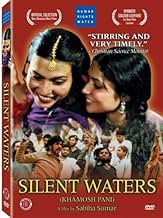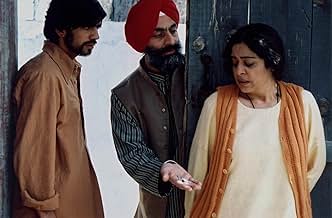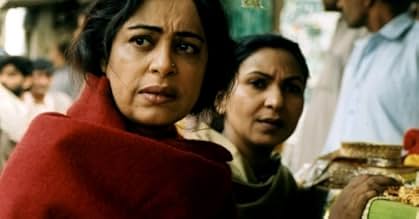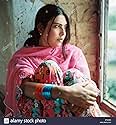IMDb रेटिंग
7.5/10
1.3 हज़ार
आपकी रेटिंग
अपनी भाषा में प्लॉट जोड़ें1979. A village in Pakistan. A widow sees her 17 years old son being attracted to Islamist militants. It brings her past back.1979. A village in Pakistan. A widow sees her 17 years old son being attracted to Islamist militants. It brings her past back.1979. A village in Pakistan. A widow sees her 17 years old son being attracted to Islamist militants. It brings her past back.
- पुरस्कार
- 8 जीत और कुल 2 नामांकन
Aamir Ali Malik
- Saleem
- (as Aamir Malik)
Navtej Singh Johar
- Jaswant
- (as Navtej Johar)
Arshad Mahmood
- Mehboob
- (as Arsad Mahmud)
Fareeha Jabeen
- Shabnam
- (as Fariha Jabeen)
फ़ीचर्ड समीक्षाएं
There is a side to Pakistan most of us are blind to. At least visually.
Director Sabiha Sumar presents that side to us -- a desolate, barren Pakistan, a magnificent, sprawling wasteland worthy of a Sergio Leone classic. For someone used to the congested streets of an Indian metropolis, seeing this grand, hilly Pakistani village, full of whispered secrets and echoed threats holds a surreal poignancy.
In the Charkhi village of Punjab in Pakistan, life is quirky, quaint, and increasingly foreboding. The setting itself presents a paradox: there are fortresses available for youngsters to romantically rendezvous, but no place for a kafir (non-Muslim) to hide.
Khamosh Pani revolves around the life of a simple, middle-aged woman, Ayesha, played by Kirron Kher. She seems normal enough, a typical Pakistani lady, living the placid life of a widow, supporting her family by giving Quran lessons to neighbourhood children. As the film builds slowly into its plot, we begin to suspect the central protagonist is actually her wistful son, Saleem.
Saleem, played by Aamir Malik, looks exactly in the Jimmy Mistry (The Guru, East Is East) mold, just floppier, lazy, and intensely likable. With a boyish grin firmly in place, he is smitten with girl-next-door, the no-nonsense Zubeida, who's trying to goad him into getting a job.
As the two murmur besotted secrets to each other across the roofs of conveniently empty minarets, Saleem realises that Zubeidaa's dreams of going to college and fashioning her career and her own riches far outweigh his own. In fact, he doesn't have any dream at all, just shuffling through life listlessly. He needs a vocation, a higher cause to believe in.
At this crucial juncture in his youth, Charkhi's naïveté is shattered by the arrival of Islamic fundamentalists. We suddenly realize that the year is 1979, and we're told emotionally that Prime Minister Zulfikar Ali Bhutto has just been hanged.
There is ample scope for over-dramatisation, but the scene has been handled with wonderful restraint -- a postman stands by his bicycle, seemingly lost. When Ayesha repeatedly asks him what's wrong, he just shakes his head and shows her the paper, muttering in disbelief that the prime minister has been hanged. Immediately, we're framed into uncannily familiar perspective:
General Zia's period of marshal law has begun.
As the Sikhs are allowed to cross the border and revisit their native places of worship, dissent and fundamentalism sets in deeper. Saleem is now one of them, a misguided boy strongly hanging on to a deluded version of Allah.
The film turns darker and more sombre as an important issue comes evocatively to the fore. A gentle visiting Sikh alludes to the prospect of some female relatives being left behind during Partition, but is silenced vehemently by those around him. It is an issue of pride, and we are awakened to the nightmare that families actually killed their own, sacrificing them brutally to avoid dishonor at the hands of the enemy.
The irony is painfully simple: the womanfolk were actually safer in the hands of the very enemy, whose attempt at dishonor was probably preferable to the slaughter their own families put them through.
Zubair (Navtej Johar), however, is a Sikh determined to find his long-lost elder sister, and is sure she lived around these parts. The film is based on true incidents of the time, and as we shuttle through flashback and the present, Khamosh Pani confronts us with information many of us are unaware of.
The film is subtle, and refreshingly free of hysteria, enough to make it one of the best films in the increasingly crowded Partition genre, and reminds us that the subject still has so much to explore. It's a film striking in its simplicity, unlike most recent attempts that usually peter off into melodrama or pander to clichés and even propaganda.
Most directors, with an eye on the festival circuit, try to exaggerate their viewpoints, and show off cinematic abilities. Mira Nair is a case in point. Here, the debutante filmmaker has made a commendable first effort, with visible sincerity. Her lead actress, Kher, has done an overwhelming job, underplayed but truly a wonderfully written role.
This is the first Pakistani film I've ever watched; Sabiha Sumar has made sure it won't be the last.
Director Sabiha Sumar presents that side to us -- a desolate, barren Pakistan, a magnificent, sprawling wasteland worthy of a Sergio Leone classic. For someone used to the congested streets of an Indian metropolis, seeing this grand, hilly Pakistani village, full of whispered secrets and echoed threats holds a surreal poignancy.
In the Charkhi village of Punjab in Pakistan, life is quirky, quaint, and increasingly foreboding. The setting itself presents a paradox: there are fortresses available for youngsters to romantically rendezvous, but no place for a kafir (non-Muslim) to hide.
Khamosh Pani revolves around the life of a simple, middle-aged woman, Ayesha, played by Kirron Kher. She seems normal enough, a typical Pakistani lady, living the placid life of a widow, supporting her family by giving Quran lessons to neighbourhood children. As the film builds slowly into its plot, we begin to suspect the central protagonist is actually her wistful son, Saleem.
Saleem, played by Aamir Malik, looks exactly in the Jimmy Mistry (The Guru, East Is East) mold, just floppier, lazy, and intensely likable. With a boyish grin firmly in place, he is smitten with girl-next-door, the no-nonsense Zubeida, who's trying to goad him into getting a job.
As the two murmur besotted secrets to each other across the roofs of conveniently empty minarets, Saleem realises that Zubeidaa's dreams of going to college and fashioning her career and her own riches far outweigh his own. In fact, he doesn't have any dream at all, just shuffling through life listlessly. He needs a vocation, a higher cause to believe in.
At this crucial juncture in his youth, Charkhi's naïveté is shattered by the arrival of Islamic fundamentalists. We suddenly realize that the year is 1979, and we're told emotionally that Prime Minister Zulfikar Ali Bhutto has just been hanged.
There is ample scope for over-dramatisation, but the scene has been handled with wonderful restraint -- a postman stands by his bicycle, seemingly lost. When Ayesha repeatedly asks him what's wrong, he just shakes his head and shows her the paper, muttering in disbelief that the prime minister has been hanged. Immediately, we're framed into uncannily familiar perspective:
General Zia's period of marshal law has begun.
As the Sikhs are allowed to cross the border and revisit their native places of worship, dissent and fundamentalism sets in deeper. Saleem is now one of them, a misguided boy strongly hanging on to a deluded version of Allah.
The film turns darker and more sombre as an important issue comes evocatively to the fore. A gentle visiting Sikh alludes to the prospect of some female relatives being left behind during Partition, but is silenced vehemently by those around him. It is an issue of pride, and we are awakened to the nightmare that families actually killed their own, sacrificing them brutally to avoid dishonor at the hands of the enemy.
The irony is painfully simple: the womanfolk were actually safer in the hands of the very enemy, whose attempt at dishonor was probably preferable to the slaughter their own families put them through.
Zubair (Navtej Johar), however, is a Sikh determined to find his long-lost elder sister, and is sure she lived around these parts. The film is based on true incidents of the time, and as we shuttle through flashback and the present, Khamosh Pani confronts us with information many of us are unaware of.
The film is subtle, and refreshingly free of hysteria, enough to make it one of the best films in the increasingly crowded Partition genre, and reminds us that the subject still has so much to explore. It's a film striking in its simplicity, unlike most recent attempts that usually peter off into melodrama or pander to clichés and even propaganda.
Most directors, with an eye on the festival circuit, try to exaggerate their viewpoints, and show off cinematic abilities. Mira Nair is a case in point. Here, the debutante filmmaker has made a commendable first effort, with visible sincerity. Her lead actress, Kher, has done an overwhelming job, underplayed but truly a wonderfully written role.
This is the first Pakistani film I've ever watched; Sabiha Sumar has made sure it won't be the last.
This amazing picture is undoubtedly a statement on the never-ending religious war that has become a sad but integral part of history. Terrible to see how people are not allowed to live their life in peace, so much that some of them are forced to change their primary identity in order to survive. This story takes place in 1979 in the village of Charkhi, Pakistani Punjab, where middle-aged widow Ayesha lives a poor lifestyle with her 18-year-old son Saleem. She makes a living from her late husband's pension and by teaching the Quran to young girls. Her son Saleem is a handsome, simple and likable guy who is in love with a young girl named Zubeida. But soon starts the trouble, when Saleem suddenly gets involved with a group of Islamists. He breaks up from Zubeidaa, and Ayesha is frightened to see her son turning into an extremist, as this brings her past back and reminds her of a secret which has haunted her for years, a secret of which even Saleem is unaware. Painful flashbacks to the violent Partition hint, with a woman standing on the well's edge, are heartbreaking. One brave woman chose to live, but now circumstances take her back to this very damned well, to complete the uncompleted.
Khamosh Pani is a film evidently made with passion and sincerity. It is brilliantly directed and acted. The story is one of its kind, and the execution is superb. The dialogues are very well-written and the film is benefited by a wonderful background score. Sabiha Sumar skillfully captures the dim atmosphere of the Pakistani Punjab, and the quiet, sombre narrative style effectively symbolises the silent waters it deals with. The power of this film seems to come not only from the realistic way in which it was depicted and the honesty with which its issue was handled, but equally from the roundly excellent acting. Sumar's cast, which consists mainly of Indian actors, is led by one of the finest actresses in India, Kirron Kher. Kher is outstanding as the struggling, strong and tormented Ayesha, and infuses her role with depth and pathos very few actresses would be able to. Aamir Malik is convincing as Saleem, and his character's transformation from a carefree romantic fool to a decisive Islamist is well done. Shilpa Shukla is lovely as Zubeidaa but she mostly shines in the film's last scene.
To sum it up, Khamosh Pani is one exceptional piece of art. The many ironies it conveys are horrifying but simple. The film's last few sequences are deeply moving and touching. One scene (you will know what I am talking about) is really poignant. I highly recommend you to see this film.
Khamosh Pani is a film evidently made with passion and sincerity. It is brilliantly directed and acted. The story is one of its kind, and the execution is superb. The dialogues are very well-written and the film is benefited by a wonderful background score. Sabiha Sumar skillfully captures the dim atmosphere of the Pakistani Punjab, and the quiet, sombre narrative style effectively symbolises the silent waters it deals with. The power of this film seems to come not only from the realistic way in which it was depicted and the honesty with which its issue was handled, but equally from the roundly excellent acting. Sumar's cast, which consists mainly of Indian actors, is led by one of the finest actresses in India, Kirron Kher. Kher is outstanding as the struggling, strong and tormented Ayesha, and infuses her role with depth and pathos very few actresses would be able to. Aamir Malik is convincing as Saleem, and his character's transformation from a carefree romantic fool to a decisive Islamist is well done. Shilpa Shukla is lovely as Zubeidaa but she mostly shines in the film's last scene.
To sum it up, Khamosh Pani is one exceptional piece of art. The many ironies it conveys are horrifying but simple. The film's last few sequences are deeply moving and touching. One scene (you will know what I am talking about) is really poignant. I highly recommend you to see this film.
I am at a loss of words after watching this one which is more than a film, it is an experience therefore, the only words in which this masterpiece can be described are adjectives-mind blowing, shocking, great in narrative and style, simple and subtle, poignant, brilliant exposition. Here is finally a movie, that shocks you, surprises you, questions you, slaps you, make you cry, shows you a mirror-to sum up evoke strong responses. The film finally succeeds in speaking a universal language. Here No sides are taken but just roots you to the middle of the premise. It touched the epic proportions of earlier masterpieces Garam Hawa and Tamas, based on partition issues. Though an influence of Iranian new wave cinema is seen on film maker sabiha sumer yet it is an original piece. A superior product, a touching tale, a classic world cinema, indeed.. "Jinhe naaz hai Black par wo kahan hain".
Perhaps the first south Asian film that has had such a lasting impression on me, Khamosh Pani has hardly received the glory it truly deserves. Watching the film leaves you senseless for about half an hour and then it knocks all the wind out of you.
Khamosh Pani takes the viewer to a small village in Pakistan where life evolves. Specifically it focuses on Ayesha and her son Saleem and their relationship. Ayesha never goes to the village well to draw water while Saleem gets seduced by Islamic fundamentalists and transforms from a love sick puppy to the man he thinks he wants to be.
Sabiha Sumar, perhaps one of the best directors in the subcontinent, tells us the story of a small village in Pakistan. With perhaps one of the most powerful issues to deal with, Sumar displays true genius by making everything seem so subtle and hauntingly real. Perhaps, the greatest strength lies in convincing the audience that the statement need not be made in black and white and in this respect Sumar shines.
To say that the acting performances were excellent would be the understatement of the century. One watches in amazement at how real and authentic each character is. The mind knows that what it sees are actors and yet it refuses to believe what it knows. Every single character, from an extra to the leads adds to the tremendous energy that the film brings with it. Kirron Kher as Ayesha/Veero is stunning, so much so that one cannot imagine her as anyone else. Aamir Ali Malik is another actor who plays with the audience, seducing them and disturbing them through the course of the film As an Indian separated from the partition by two generations I can't really say that I feel the pain that my mother does when she sees a film such as this, I have heard stories of my grand aunt who was attacked and mutilated by a mob in Lahore when my mothers family had to leave for India. Perhaps my lack of sentimental attachment makes me see it a little more objectively. Khamosh Pani has exposed me to some of this pain and while it may not be my own I can feel it. But the question that arose in my mind is that those that were around when this bloodshed (on both sides) occurred have mostly died or are dying, will we succeeding generations ever know this pain? The pain of leaving behind a wife, killing your own daughter, leaving her to be raped, Living in another country when that which was once a part of you lives somewhere else. How can I fight for this when I don't know what its like? Khamosh Pani made me feel this pain for a few days; perhaps we need more reminders such as these so that we can experience the pain to forget.
Khamosh Pani takes the viewer to a small village in Pakistan where life evolves. Specifically it focuses on Ayesha and her son Saleem and their relationship. Ayesha never goes to the village well to draw water while Saleem gets seduced by Islamic fundamentalists and transforms from a love sick puppy to the man he thinks he wants to be.
Sabiha Sumar, perhaps one of the best directors in the subcontinent, tells us the story of a small village in Pakistan. With perhaps one of the most powerful issues to deal with, Sumar displays true genius by making everything seem so subtle and hauntingly real. Perhaps, the greatest strength lies in convincing the audience that the statement need not be made in black and white and in this respect Sumar shines.
To say that the acting performances were excellent would be the understatement of the century. One watches in amazement at how real and authentic each character is. The mind knows that what it sees are actors and yet it refuses to believe what it knows. Every single character, from an extra to the leads adds to the tremendous energy that the film brings with it. Kirron Kher as Ayesha/Veero is stunning, so much so that one cannot imagine her as anyone else. Aamir Ali Malik is another actor who plays with the audience, seducing them and disturbing them through the course of the film As an Indian separated from the partition by two generations I can't really say that I feel the pain that my mother does when she sees a film such as this, I have heard stories of my grand aunt who was attacked and mutilated by a mob in Lahore when my mothers family had to leave for India. Perhaps my lack of sentimental attachment makes me see it a little more objectively. Khamosh Pani has exposed me to some of this pain and while it may not be my own I can feel it. But the question that arose in my mind is that those that were around when this bloodshed (on both sides) occurred have mostly died or are dying, will we succeeding generations ever know this pain? The pain of leaving behind a wife, killing your own daughter, leaving her to be raped, Living in another country when that which was once a part of you lives somewhere else. How can I fight for this when I don't know what its like? Khamosh Pani made me feel this pain for a few days; perhaps we need more reminders such as these so that we can experience the pain to forget.
Its easier to stand on the present day and judge the event on the basis of right and wrong (of course staying within the limits of being politically correct). Khamosh Paani does a bit more than that. It goes back in time and attempts to point at the situations/ circumstances/ events where the seeds of terrorism & fundamentalism were sown by wily politicians in the garb of uniting the people to cleanse the nation. Khamosh Paani is an introspection and references to the Godzilla staring at everyones face today. Through the character of Veero/ Ayesha the director attempts to give a message that history is bound to repeat itself when the path of extremism is chosen.
Kiron Kher: Veero/ Ayesha has seen it before and its almost like a a deja vu should her son chooses to tread the path. The pain and anguish of the mother, yet being resilient to hold back the truth is well portrayed.
Aamir Ali Malik: He does a good job of donning various caps from a headless "lover-boy" chicken, metamorphosing into a purpose-filled jihaadi youth.
Shilpa Shukla: It took me a while to recollect this "Chak De" girl. Her character was merely "used" to show the ideology change in Saleem owing to which the there isn't much meat.
The built up of the events and narrative deserves brownie points. The prosake village life where everybody is living harmoniously like a family is depicted well and the initiation of the snail-paced transformation.
Sabiha Sumar has a story to tell and it does come with a bitter pill, therefore the viewpoint is open to debate. And the barrage of pot calling the kettle black starts - NOW!
Kiron Kher: Veero/ Ayesha has seen it before and its almost like a a deja vu should her son chooses to tread the path. The pain and anguish of the mother, yet being resilient to hold back the truth is well portrayed.
Aamir Ali Malik: He does a good job of donning various caps from a headless "lover-boy" chicken, metamorphosing into a purpose-filled jihaadi youth.
Shilpa Shukla: It took me a while to recollect this "Chak De" girl. Her character was merely "used" to show the ideology change in Saleem owing to which the there isn't much meat.
The built up of the events and narrative deserves brownie points. The prosake village life where everybody is living harmoniously like a family is depicted well and the initiation of the snail-paced transformation.
Sabiha Sumar has a story to tell and it does come with a bitter pill, therefore the viewpoint is open to debate. And the barrage of pot calling the kettle black starts - NOW!
क्या आपको पता है
- ट्रिवियाThe film had trouble finding a distributor for theatrical release in Pakistan, due to perceived lack of market. Despite this the filmmakers organized 41 free screenings throughout small towns and villages all across the country, starting with a premiere in Wah, where the film was shot.
- कनेक्शनFeatured in Women Make Film: A New Road Movie Through Cinema (2018)
टॉप पसंद
रेटिंग देने के लिए साइन-इन करें और वैयक्तिकृत सुझावों के लिए वॉचलिस्ट करें
विवरण
- रिलीज़ की तारीख़
- कंट्री ऑफ़ ओरिजिन
- आधिकारिक साइटें
- भाषाएं
- इस रूप में भी जाना जाता है
- Khamosh Pani: Silent Waters
- फ़िल्माने की जगहें
- उत्पादन कंपनियां
- IMDbPro पर और कंपनी क्रेडिट देखें
बॉक्स ऑफ़िस
- US और कनाडा में सकल
- $7,384
- US और कनाडा में पहले सप्ताह में कुल कमाई
- $1,617
- 10 अक्टू॰ 2004
- दुनिया भर में सकल
- $7,384
इस पेज में योगदान दें
किसी बदलाव का सुझाव दें या अनुपलब्ध कॉन्टेंट जोड़ें






















